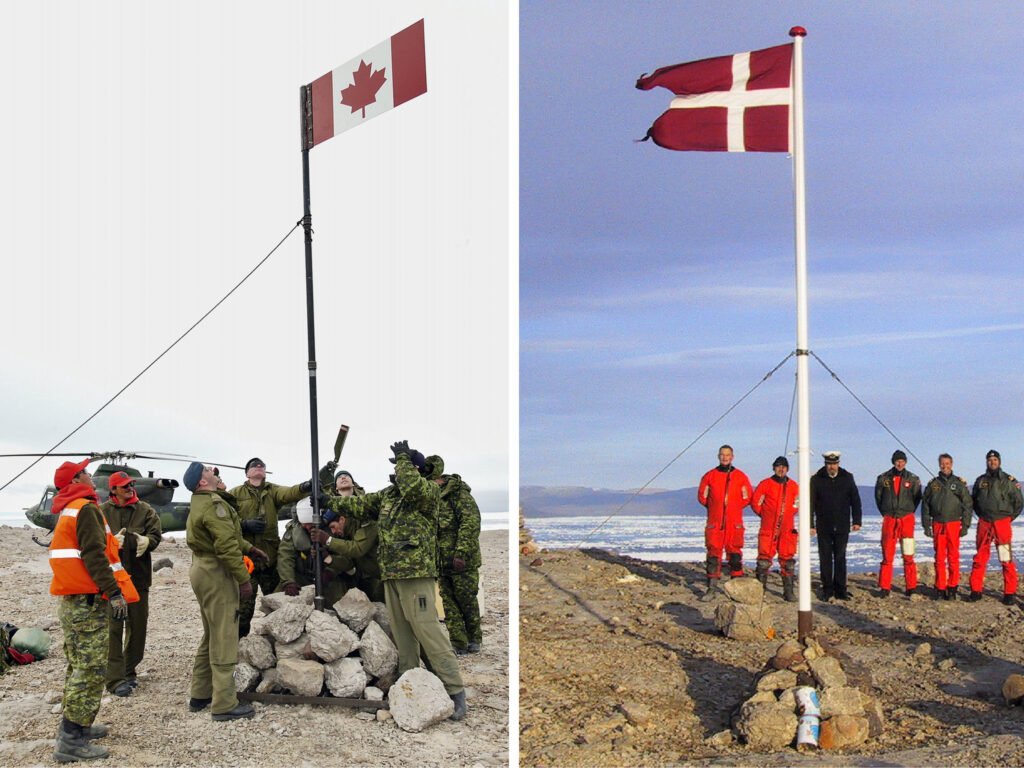In the wake of Russia’s invasion of Ukraine, world leaders found it essential to put aside their differences and show united support for Ukraine. Around the time the war first began, Canadian and Danish officials signed an agreement that officially settled their border disagreement of over fifty years. Yet the resolution of this minor conflict scarcely gets talked about. So what is it? Why is it significant?
Hans Island is a minuscule island with no resources or vegetation, situated in a channel between the Danish autonomous territory of Greenland and the Canadian Ellesmere Island. The disagreement over Hans Island began in 1973 when Canadian and Danish diplomats met to discuss maritime borders. When Hans Island got in the way, the diplomats left the question unanswered, choosing instead to continue with the maritime boundary. In the following decades, Canada and Denmark engaged in one of the friendliest wars in history, the Whiskey War. Despite being one of the most peaceful wars in history, the Whiskey War nearly caused Canada to go to war with Denmark when the Danish Navy surrounded the island with gunboats to establish their authority there.
Things changed, however, when Russia invaded Ukraine. Western powers anxiously sought ways to minimize the conflict and encourage the Russians to consider a peaceful alternative to invasion. Denmark and Canada, eager to seize a symbolic opportunity, quickly agreed to divide Hans Island between themselves diplomatically. Sixty percent of the island went to Denmark, while Canada got to keep the rest. Moreover, all indigenous groups nearby had free access to the island for fishing or cultural activities. The goal of this agreement was to provide an example of a peaceful settlement of a border dispute per international law — a small light in the darkness of the Russo-Ukrainian War. The peacefulness of the affair shines through even more as Danish and Canadian officials exchange gifts (bottles of liquor) at the signing of the agreement.
Though the agreement has achieved a legacy as one of the most peaceful border dispute resolutions in history, its validity as a role model is debatable. After all, violence nearly became a reality of the situation. And what did it say about the state of the world if the two friendliest countries needed fifty years to resolve a conflict over an insignificant rock? Hans Island may be of zero significance to any country in the future, and yet Canada nearly went to war against Denmark over it. How can peacefully resolving disputes be considered in situations with far higher stakes, such as the case with Ukraine and Russia, if even something this minor, takes half a century?
Regardless of what the implications of this historic agreement are or whether or not it can serve as a role model for future border disputes, the compact over Hans Island remains an important event, revealing much about the world in which it takes place — its politics, its values, and the lens with which it views itself. And as the world changes — for better or worse, one thing remains evident: even the slightest pieces have a part to play in the larger whole.
Works Cited
Associated Press. “Danish-Canadian Deal Ends 49-Year-Old Feud over Arctic Isle.” NBC News, 15 June 2022, www.nbcnews.com/news/world/denmark-canadian-deal-hans-island-ends-49-year-old-feud-arctic-isle-rcna33644. Accessed 28 Aug. 2023.
Austen, Ian. “Canada and Denmark End Their Arctic Whisky War.” The New York Times, 14 June 2022, www.nytimes.com/2022/06/14/world/canada/hans-island-ownership-canada-denmark.html.Coletta, Amanda. “Ukraine War Brings Peace — between Canada and Denmark.” Washington Post, 14 June 2022, www.washingtonpost.com/world/2022/06/14/canada-denmark-greenland-hans-island/.
